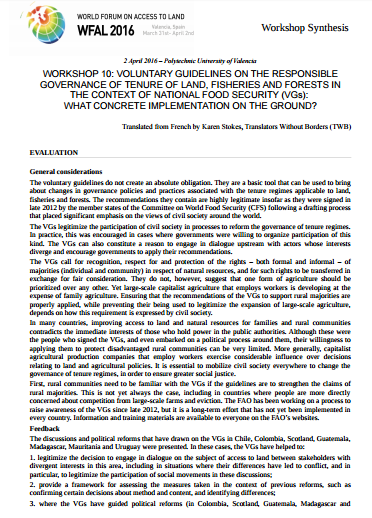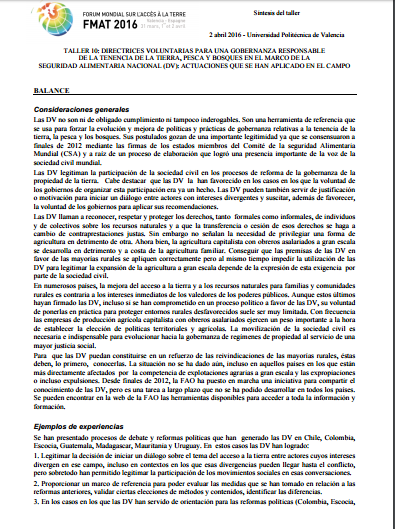Rights-based fisheries governance: from fishing rights to human rights
“As a husband I will love, lead, and provide:” Gendered access to land in Ghana
Improving women’s access to land is high on the agricultural policy agenda of both governmental and non-governmental agencies. Yet, the determinants and rationale of gendered access to land are not well understood. This paper argues that gender relations are more than the outcomes of negotiations within households. It explains the importance of social norms, perceptions, and formal and informal rules shaping access to land for male and female farmers at four levels: (1) the household/family, (2) the community, (3) the state, and (4) the market. The framework is applied to Ghana.
Smallholders and land tenure in Ghana: Aligning context, empirics, and policy
For decades, policymakers and development practitioners have debated benefits and threats of property rights formalization and private versus customary tenure systems. This paper provides insights into the challenges in understanding and empirically analyzing the relationship between tenure systems and agricultural investment, and formulates policy advice that can support land tenure interventions. We focus on Ghana, based on extensive qualitative fieldwork and a review of empirical research and policy documents.
WORKSHOP 5: THE DIFFICULTIES OF WOMEN’S ACCESS TO LAND AND NATURAL RESOURCES
Throughout the world, the vast majority of women are faced with conditions of access to land and control of land and natural resources that are unequal to those of men.
Social relations have trivialized the fact that they are entirely in charge of domestic work and the education of children, which prevents them from devoting themselves as much as men to agricultural activities. In the fields, they are the forced laborers of the family and take on the often less valued tasks, considered as part of their domestic obligations. As a result, they generally receive no income.
ATELIER 5 : LES DIFFICULTES D’ACCES DES FEMMES À LA TERRE ET AUX RESSOURCES NATURELLES
Partout dans le monde, l’immense majorité des femmes fait face à des conditions d’accès et de contrôle de la terre et des ressources naturelles inégales à celles des hommes.
TALLER 5: LAS DIFICULTADES DE ACCESO A LA TIERRA Y A LOS RECURSOS NATURALES PROPUESTAS PARA LAS MUJERE
Por todo el mundo, la inmensa mayoría de mujeres se enfrenta a condiciones desiguales de control y acceso a la tierra y a los recursos naturales respecto a los hombres.
WORKSHOP 10: VOLUNTARY GUIDELINES ON THE RESPONSIBLE GOVERNANCE OF TENURE OF LAND, FISHERIES AND FORESTS IN THE CONTEXT OF NATIONAL FOOD SECURITY (VGs): WHAT CONCRETE IMPLEMENTATION ON THE GROUND?
The voluntary guidelines do not create an absolute obligation. They are a basic tool that can be used to bring about changes in governance policies and practices associated with the tenure regimes applicable to land, fisheries and forests. The recommendations they contain are highly legitimate insofar as they were signed in late 2012 by the member states of the Committee on World Food Security (CFS) following a drafting process that placed significant emphasis on the views of civil society around the world.
TALLER 10: DIRECTRICES VOLUNTARIAS PARA UNA GOBERNANZA RESPONSABLE DE LA TENENCIA DE LA TIERRA, PESCA Y BOSQUES EN EL MARCO DE LA SEGURIDAD ALIMENTARIA NACIONAL (DV): ACTUACIONES QUE SE HAN APLICADO EN EL CAMPO
Las DV no son ni de obligado cumplimiento ni tampoco inderogables. Son una herramienta de referencia que se usa para forzar la evolución y mejora de políticas y prácticas de gobernanza relativas a la tenencia de la tierra, la pesca y los bosques. Sus postulados gozan de una importante legitimidad ya que se consensuaron a finales de 2012 mediante las firmas de los estados miembros del Comité de la seguridad Alimentaria Mundial (CSA) y a raíz de un proceso de elaboración que logró una presencia importante de la voz de la sociedad civil mundial.
ATELIER 10 : DIRECTIVES VOLONTAIRES POUR UNE GOUVERNANCE RESPONSABLE DES RÉGIMES FONCIERS APPLICABLES AUX TERRES, AUX PÊCHES ET AUX FORÊTS DANS LE CONTEXTE DE LA SÉCURITÉ ALIMENTAIRE NATIONALE (DV) : QUELLE MISE EN ŒUVRE SUR LE TERRAIN ?
Les DV n’ont pas force d’obligation indérogeable. C’est un outil de référence mobilisable pour faire évoluer les politiques et pratiques de gouvernance relatives à la tenure des régimes fonciers applicables aux terres, pêches et forêts. Leurs préconisations bénéficient d’une forte légitimité puisqu’elles ont réuni, fin 2012, les signatures des États membres du Comité de la Sécurité Alimentaire Mondiale (CSA), suite à un processus d’élaboration qui a accordé une place importante à l’expression de la société civile mondiale.
“We can‘t be satisfied yet“
On the 11th May 2012, the Committee on World Food Security of the United Nations adopted the Voluntary Guidelines on the Responsible Governance of Tenure of Land, Fisheries and Forests (VGGT). Rural 21 asked Roman Herre of the human rights organisation FIAN about his views on the implementation of the Guidelines so far.











